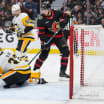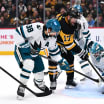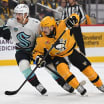Whenever Evgeni Malkin does interviews, he is open, honest and candid. We had the chance to sit down with him numerous times before he reached the 1,000-point mark, where he reflected on his own personal memories from the last 13 years. Here is the story of Malkin's career and legacy, compiled through several exclusive interviews with the Penguins superstar.
MA1KIN: Malkin reflects on his career and legacy
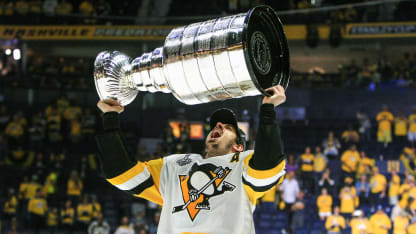
By
Michelle Crechiolo
Penguins Team Reporter
Growing up, Evgeni Malkin didn't think too much about the NHL.
For him, a young boy born and raised in the blue-collar steel town of Magnitogorsk, Russia, it was all about the local team - Metallurg Magnitogorsk.
"Growing up in a small town, I never think about the NHL," Malkin said. "I never watched on TV, I never watched highlights. I remember the Detroit team winning a couple (Stanley) Cups. They played unbelievable. But I did not watch much hockey, did not know much about the NHL."
Malkin's dream was to play for his hometown team, so that's what he worked toward. Finally, at age 17, he was able to achieve that dream by suiting up for Metallurg Magnitogorsk. And that's when Malkin's dream grew bigger.
"After, I started to think NHL," he said. "Then the Penguins drafted me No. 2 in the draft in Carolina. I understand my dream was coming true. Just keep going to work, do the right things, and after a couple years I come to Pittsburgh."
It wouldn't be quite that simple - a lot happened in those two years to make Malkin think that would never make it to Pittsburgh.Click here to read more about Malkin's journey.
But he did, and now, 13 years later, Malkin has become the 88th player in NHL history to record 1,000 points.
"I never thought about the NHL, never thought I (would) make 1,000 points (laughs), win three Cups already," Malkin said with a laugh. "It's like, I still can't believe what's going on right now.One thousand points, it's a great number. I play with a good team, we win three Cups, it's an amazing 13 years already."
And to think there was a time where Malkin thought he didn't have what it took to play in this league.
After a dramatic, thriller-novel-esque escape from Russia, Malkin arrived in Pittsburgh on Sep. 4, 2006. He signed his first NHL contract, a three-year entry-level deal, with the Penguins the next day.
Just over two weeks later, Malkin made his much-anticipated NHL preseason debut in Moncton, New Brunswick, where the Penguins were playing the Philadelphia Flyers in a neutral-site exhibition game.
In the second period, Malkin and his teammate John LeClair collided behind the net, and the rookie catapulted over the veteran before collapsing to the ice. Malkin laid there for several minutes before eventually skating off of his own accord and being taken to a local hospital, eventually learning that he had dislocated his left shoulder.
Malkin had risked everything to come to America to play in the NHL. He left his small town for a foreign country, a land where he couldn't speak the language and had no friends or family. And just when he was on the cusp of living his dream, it all seemed to be crashing down.
"I think it's maybe the hardest moment in my life," Malkin said. "Because I come to the U.S., it's all new - the game, practice. I try to work hard every day, and the first exhibition game against Philly I get a bad injury. I talked to the doc and he said it's not an easy injury, you can do surgery or you can hold off, it's your choice."
So despite everything that Malkin had gone through to get there, he found himself re-evaluating his future in Pittsburgh and the NHL and whether he had made the right choice to leave his old life behind.
"I'm sitting in the locker room and thinking, whoa, maybe I (should) go back to Russia," Malkin said. "Because it's not my game, it's a hard game, it's just an exhibition game and it's already an injury. I called my parents, friends and said maybe I'm not ready to play here, you know? Sometimes I think about this, maybe I'm not strong enough."
Fortunately, those thoughts and those doubts began to dissipate as he started the rehab process and began working to get his shoulder back to full strength.
"After I started to (rehab), I said it's my dream to stay here, be stronger and it's good," Malkin said. "I came back pretty quick and I missed the first four games, but I come back and the first game, first goal, it's pretty amazing."
When Malkin reflects back on all of the moments that have happened throughout his career, his first day in the NHL stands out to him more than anything - even more than the three Stanley Cups.
The Penguins were hosting the New Jersey Devils on Oct. 18, 2006, and Malkin remembers that day like it was yesterday - waking up, eating breakfast and going through a short morning skate before arriving at the rink later that afternoon.
"I remember when I'm in the locker room I'm very nervous," Malkin said. "It's my first NHL game, it's after an injury. When I step on the Ice, I look (at the) fans around and everyone stands up and claps. It's an amazing moment, they all support me. I believe all fans were waiting for me to get into town. Because there were a couple stories in the magazines, they say Geno is in town, he's back.
"It's my first game in the NHL. My dream, it has come true. People love me and people wait for me and they support me. It's an amazing moment because I look around and they all stood and clapped."
That night, in front of the adoring crowd, Malkin scored what would be the first of his 1,000 NHL points, a goal on Hall of Fame netminder Martin Brodeur.
"It's not pretty, but it's amazing because you're nervous, for sure, first game, after injury," Malkin said. "But this goal gives me confidence, for sure."
Malkin went on to score seven goals in his first six NHL games, becoming the first player in 89 years to accomplish that feat. It was a season full of historic moments for both Malkin and Sidney Crosby, his fellow franchise center whose legacies would become entwined together over the years.
"There was a lot of talk about him," Crosby said. "I remember playing my first year here and everyone talking about him and his highlights and all of that stuff. You expect it to take a little bit of time to adjust with the different size ice and a new league, but he just came in and dominated right away. It was so fun. We were a pretty young team so we had a lot of younger guys kind of thrown in right away, and I just remember having a lot of fun just watching him do his thing out there."
Malkin captured the Calder Trophy as the league's top rookie, while Crosby became the youngest player in NHL history to win a scoring title by posting a career-high 120 points at 19 years and 241 days.
"It was like, wow," Malkin said with a laugh when remembering his rookie season. "Because my first year, everyone was new for me. But Sid was already a legend here. His second year, he scored 120 points. I think he played the best year of his life. He was like dominating every shift and just a joy to watch."
Michel Therrien, who was the Penguins head coach at the time, knew that Malkin was more than capable of joining Crosby at the top.
"For me, Geno was like Sid," Therrien said. "They were special."
The next year, Malkin had lots of meetings with Therrien. The coach's goal was to make his young superstar understand that his potential was, as he put it, "off the charts."
"I just wanted to make him understand that he had a lot more to give," Therrien said. "I wanted him to understand that at an early age. I didn't want him to be satisfied. At the time, Evgeni was a great player. I wanted him to be on top."
They would talk constantly, always with then-teammate Sergei Gonchar, a Russian native, present to help with the language barrier between Malkin and Therrien, who is from Quebec.
"I want to say thank you to him. He gave me a lot," Malkin said of Therrien. "He tried to speak with me like every day, and tell me you need to be a top-five player in the NHL every year, not just when you're a rookie. You need to win everything, like Hart Trophy (league MVP), Art Ross (scoring title), Conn Smythe Trophy (playoff MVP). He would tell me this every day. He'd tell me you need to work so hard every day."
There were a couple of meetings in particular that stood out. The first one came before a game against the Atlanta Thrashers in January of 2008, when Therrien pulled Malkin into the coaches' office at Philips Arena and showed him a printed list of the NHL scoring leaders, where Malkin was outside of the top-10 at that point.
"I showed him the stats of players in the league and I showed him where he was," Therrien said. "I showed him because he had a hard time speaking English at the time. I show him where I want him to be. I want him to be on top of the league, like Sid. He said, 'yes coach' (laughs)."
The second one came later that month, after Crosby suffered a high-ankle sprain that would keep him out until March.
"It was a new challenge for me when Sid had the injury," Malkin recalled. "We knew he was out a long time. I remember meeting with Therrien, he told me, 'It's your time right now. You need to take leadership of this group. I will give you more time to play. You will play over 20 minutes a night and I will give you whatever you want. Just be a leader.'"
Of course, Malkin admitted that he was nervous, but that he understood and accepted the responsibility that he now had. As he put it, "I understand if we lose a couple games, everyone looks to me."
Malkin rose to the challenge, climbing from 13th to second in the NHL scoring race. He finished six points behind his countryman Alex Ovechkin, who had been the first-overall draft pick in 2004 ahead of Malkin, for the Art Ross Trophy as the NHL scoring champion - helping the Penguins to their first Stanley Cup Final appearance since 1992.
"I remember 2008 (Ovechkin) beat me, I finished second," Malkin said. "I was five or six points behind him, it's painful a little bit. Next year, I don't know, I got a little bit more lucky."
The next year turned out to be what Malkin feels was his best season in the NHL, as he reached the pinnacle of both individual and team success.
"That was the year we won the first Cup, it was the best year for me for sure," Malkin said.
When reflecting back on what he saw in Malkin, Therrien said that he had the whole package when it came to the tangibles - he had speed, he had skill, he had size. But Malkin also possessed something else that was more intangible.
"Those special players, they got something different, you know?" Therrien said. "Their IQ of the game, they see things on the ice that (other) players sometimes don't see. And one thing that I could tell, he had passion. Those young kids back then, they all had something in common. They had a lot of passion about winning, about being at the rink. They had a lot of fun."
When Malkin thinks back to that season, that's exactly what he remembers.
"We lost the first year, but I see we're hungry," Malkin said. "We want to practice, we want to play games because it's fun. Everyone is close to the same age. We know we need a little bit more experience. We play a couple (more) years and we'll be a good team. We know that, so we just work hard every day."
While that group did have fun, they also experienced their fair share of adversity, as the Penguins found themselves on the outside of the playoff picture in late February. As a result, the Penguins relieved Therrien of his head coaching duties, replacing him with Dan Bylsma.
But thanks in large part to the play of Malkin, the team climbed from last place to fourth in the Eastern Conference as he finished the year with a league-leading 113 points - capturing his first Art Ross Trophy as the NHL's leading scorer.
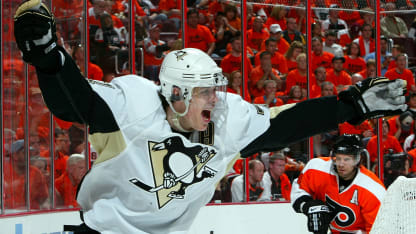
"It's a couple things, it's not just me," Malkin said. "You need to find good partners. Coach helps you too, gives you time on the power play, I played with Max Talbot and (Petr) Sykora and we had a great line. Sid was injured a little bit and I had more time to play on the ice. It's everything that gives me a little bit of a push. No injury, I played like the full season. It was a lucky season for me, for sure."
Malkin carried his incredible play into the postseason, where he recorded a league-leading 36 points - becoming the first Russian-born player and fourth-youngest player to win the Conn Smythe Trophy as playoff MVP at 22 years, 10 months as the Penguins won the Stanley Cup.
He became the fifth player in NHL history to win both the regular-season and playoff scoring titles, joining elite company in Mario Lemieux, Wayne Gretzky, Guy LaFleur and Phil Esposito.
"Just dominant," Crosby said when asked what he remembers about Malkin's play that season. "You couldn't take the puck from him, whether he was physically just stronger on the puck or playing more of a finesse game and going through guys using speed, his hands, his hockey sense. When he's like that, it's great to watch. It's fun to have a front row seat for that."
Just three years after Malkin took the ice at Mellon Arena as a scared and nervous rookie who was barely 20 years old, he was on the ice at Joe Louis Arena as a Stanley Cup champion and playoff MVP.
"It was like my dream is coming true," he said. "It's all a surprise to me, you know. Because I come to U.S. and after three years we win the Stanley Cup. I can't say because I don't have a word to say how amazing of a feeling it is, you know? You need just to believe and you can do everything."
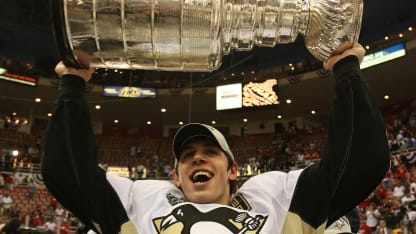
Malkin suffered a big setback in the 2010-11 season when he tore his ACL and MCL in a collision with Sabres defenseman Tyler Myers in a game against Buffalo on Feb. 4. Malkin had to undergo surgery and was given a recovery timeframe of six months.
The injury was an eye-opener for the young Russian, as it made him realize just how badly he wanted to be on the ice with his teammates and how much he wanted to get back to playing his best for them. So Malkin brought Mike Kadar, who was Pittsburgh's strength and conditioning coach at the time, to Moscow that summer to help him train.
A motivated Malkin trained relentlessly to regain his form following the surgery, which typically takes about 18 months to fully recover from, and was ready to go for training camp that fall.
"I had a great summer with Kadar, he came to Russia and we worked together," Malkin said. "It's a tough year for me, 2011. I want to be back and I want to show my best. I skated all summer, I worked hard and I was glad I was back and felt stronger."
Malkin did end up missing seven games early in the season after having some issues with the surgical scar and overall soreness in his knee. But once he returned, Malkin was absolutely dominant and was, by far, the best player in the game.
He had terrific chemistry with wingers Chris Kunitz and James Neal, and the trio became the best line in hockey. Neal finished the season with 40 goals while Malkin reached the 50-goal mark for the first time in his career, which was an especially momentous milestone for him personally.
"Because a year or two before, I speak with my friends and I say, I think I'm never going to score 50 goals," Malkin explained. "And after a couple years I score 50, it's so crazy. Because I think it's so hard to score 50. Who scores 50 goals? It's a huge number for me. I'm not a wing, I'm not a guy who loves to shoot every shift. I'm a little bit different player. So to score 50 goals, for me, is huge."
Malkin's numbers in themselves were impressive enough, as he also posted 109 points in just 75 games. But what made Malkin so special and so invaluable that season was how he again elevated his game when his team needed it the most, as they were forced to play most of the season without Crosby, who dressed for just 22 games due to concussion and neck issues.
"I just think with Sid out, he had that extra gear that they always talk about," Kunitz said. "When he has that, you can see the way he maneuvers his way through the ice. Just as Sid is making everyone around him better, Geno drove it to a new force and made everybody around him better and the team better."
The league recognized Malkin for his Herculean efforts that season, as he notched a metaphorical hat trick at the 2012 NHL Awards.
Malkin won his first Hart Trophy as league MVP by unanimous vote, dedicating it to his friend and mentor Gonchar; he won the Ted Lindsay Award, which is given to the league's most outstanding player as voted by his peers; and finally, he won his second Art Ross Trophy as the NHL scoring champion, defeating Tampa Bay's Steven Stamkos by 12 points - which was the largest margin of defeat since 1999 (Jaromir Jagr).
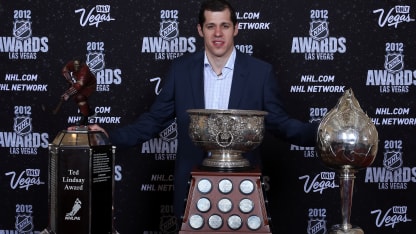
Despite all of Malkin's individual success, his team was eliminated in the Eastern Conference quarterfinals in six games by their rival Philadelphia in 2012. Then, in 2013, Malkin's Penguins advanced all the way to the Eastern Conference Final, where they were swept by Boston.
What Malkin truly wanted had nothing to do with the accolades he had accumulated - it had to do with that 35-pound silver chalice he had hoisted above his head a few years prior. He was hungrier than ever to lead his team back to the Stanley Cup, and so he signed an eight-year, $76 million extension that summer to remain in Pittsburgh.
Ray Shero, who was the Penguins general manager at the time, said that while he hoped Malkin wanted to stay long-term, he wasn't necessarily certain if that was how he felt. So the first thing Shero did once negotiations could begin was simply to ask.
"I think with players like this, first question I always ask is, 'Do you want to be here?'" Shero said. "Not sure if Evgeni Malkin at this point, after being here this long, would prefer maybe to try somewhere else and be the guy. Maybe the grass might be greener or whatever the case may be, or push his luck in free agency to see if he can the highest-paid guy as a free agent."
Thankfully, it never came close to coming to that. Shero got the answer he had hoped to hear, a resounding 'yes' - and it resulted in Malkin and the Penguins agreeing to terms on his new contract.
"I like this city," Malkin said. "It's good for hockey. I like the fans. I have a house here and all of my friends here. But it's good for me. I like the team here. It's a good team. I hope we win the Stanley Cup.
"We're still young, you know? We're a group who won the Stanley Cup before and I believe we will win again. Because it's good people, good guys. Every day we work hard in practice. Unbelievable players and someday we will win again."
Truer words were never spoken, as Malkin went on to help the Penguins win hockey's holy grail two more times in back-to-back fashion in 2016-17.
Now, at age 32, Malkin has three Stanley Cups, two Art Ross Trophies, a Hart Trophy, a Calder Trophy, a Ted Lindsay Award - and, perhaps most importantly - he has also won a Conn Smythe Trophy. He is a three-time First All-Star Team selection, a seven-time NHL All-Star and four-time Penguins team MVP.

And now, he can add 1,000 NHL points to the list.
"He's had an amazing career," Ovechkin said. "Top player in the league, he has won almost every individual and team award, three-time Stanley Cup champion. I think it's a pretty good career. And with his talent, I think he can do more."
In some ways, Malkin's legacy is complicated. Despite being a generational talent, he doesn't always get the recognition he deserves outside of Pittsburgh in the hockey world - like when he was left off the NHL's 100 Greatest Players list despite being the only player in NHL history to win three Stanley Cups, two Art Ross Trophies, a Hart Trophy, a Ted Lindsay Award and a Calder Trophy.
"He has been one of the elite players in this league for a decade-plus. And he deserves more attention for that," Penguins head coach Mike Sullivan said. "His body of work speaks for itself with what he's accomplished."
"He needed to get more recognition for the things he did," Kunitz agreed. "But having a successful teammate (Crosby) that takes a lot of media makes it tough to maybe get the recognition that he deserves. He's a guy that is so special. Throughout the players and around the league, being on different teams now, I think guys understand how generational he is. He might not get the same media attention because everyone goes to Sid, but I think being teammates and being a player, watching him play (you understand) how he plays the game and at what level he can take his game to."
But when Malkin himself thinks back about what he wants his legacy to be and how he wants fans in Pittsburgh to remember him, it's really quite simple.
"Good player, nice guy," Malkin said. "I want to play as long as I can, like seven, eight more years. I want to win a couple more Cups."
Especially because anything Malkin accomplishes from here on out, he will be able to share with his son, Nikita, who will turn 3 years old on May 31.
"I hope my son, we start to skate together and he comes to games," Malkin said. "Every game he watches in Pittsburgh, he starts to understand more. I hope he goes to school in Pittsburgh, he lives in this city and he loves this city."
Just like his father, who fell in love with Pittsburgh the second he stepped onto the ice for that first game thirteen years ago and has now become the fourth player in franchise history to accumulate 1,000 points in black and gold, joining Crosby, Jaromir Jagr and Mario Lemieux.
"We are all together," Malkin said. "You see after we win two Cups, how many fans come to the city. I hope we win again and my son touches the Cup on the ice with my father, with my mother. Because the last two times, he can't, he's too young. He watched at home, he did not understand everything. But next time, I hope. It's my dream for sure."
No matter what happens in the years to come, the fans, the organization and the city are so grateful for the endearing, entertaining and incredibly special player who grew up in Pittsburgh and helped bring three Stanley Cups to this town along with countless other memories along the way.
"I'm happy how he turned out," Gonchar said. "He became a father, a husband and a great hockey player. I'm happy to see that he's still the same guy that loves to have fun and enjoys every moment in life. He hasn't changed much. That's what I like about him. I knew him when he was young. Now he's a superstar, but he's still the same guy with the same attitude."











